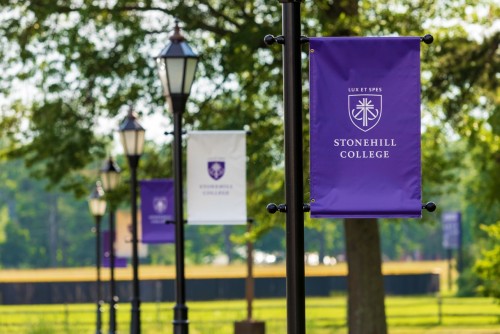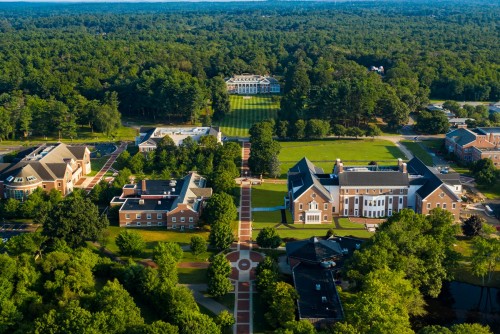New Program Puts a Human Element in Engineering Education
Professor Hassan Bajwa’s vision for Stonehill’s newest academic program centers on developing engineers who can help solve the biggest problems threatening humans and their planet.
Hassan Bajwa envisions graduates of Stonehill College’s newly launched engineering program being at the forefront of efforts to address the biggest challenges facing humanity and the planet.
“Look at the UN’s Sustainable Development Goals for 2030, [which include] no poverty, no hunger, sustainable cities, [and] affordable and clean energy,” says Bajwa, the program’s director and a respected leader in the field’s progression toward humanistic engineering. “Engineers are the ones who will lead us to reach these goals, so we must prepare our students to think about their work in the context of solving society’s most intractable problems.”
Stonehill’s newly formed engineering program builds on its long-standing 3+2 Dual-Degree Engineering program and introduces two new majors: electrical engineering and computer engineering.
The College's decision to become among the nation’s first colleges or universities to offer an undergraduate program that centers explicitly on the burgeoning humanistic approach to engineering reflects a culture where students in every discipline are encouraged to measure success based on their impact on others.
Hassan Bajwa points to a web page outlining the United Nations’ Sustainable Development Goals for 2030.
“We saw a real opportunity to create an engineering program that fits with the mission and values of Stonehill: social justice, equity [and] community stewardship,” says DeBrenna LaFa Agbényiga, provost and vice president for the Office of Academic Affairs. “That’s where humanistic engineering comes in, by preparing students to lead and change by building things that impact communities of people.”
Humanistic engineering, offered only as an optional track at other institutions, combines scientific principles with humanities and social sciences to help students apply engineering to real-world problems in our communities and society.
The program at Stonehill will prepare students to apply engineering approaches as potential solutions to complex and pressing questions facing society such as the following: Can building design better foster community? Does a modernized power grid have the potential to control climate change? What can be done to make big data work more equitably for all?
Bajwa points out that the integration of humanities and social sciences alongside traditional math- and science-based engineering curricula is a natural next step for a world in which more and more companies and industries are shifting toward social citizenship and sustainability. The cross-disciplinary nature of humanistic engineering is also a natural fit for Stonehill’s philosophy and approach to learning in which collaboration, critical thinking and team-based problem-solving are underpinnings of the liberal arts curriculum.
Bajwa sees humanistic engineering as a natural next step for a world in which more and more companies and industries are shifting toward social citizenship and sustainability.
Currently, Bajwa is working with colleagues across the college to develop shared courses that examine culture and community through an engineer’s problem-solving lens, developing the same skills that would apply to, for example, bringing clean water to an underserved community in a sustainable, equitable way. “It’s about training our students to see the problems in our society first, then draw on engineering principles to think about solving them,” he says. “It broadens their focus — and capacity for applied learning — to include much more than math equations and lab time alone.”
Additionally, a physical design-focused maker space on campus will bring in community partners to work with students on real-world problems. Both Bajwa and Agbényiga hope the program can build natural linkages with industry with partnership events, and that a master’s-level program can eventually be created to extend Stonehill’s purpose-driven design philosophy to current engineers in the field.
The humanistic emphasis within Stonehill’s engineering program is likely to attract more students to pursue a growing field with more job opportunities forecast to open up in coming years. Agbényiga says she believes the approach aligns with the core values and sense of social responsibility shared by today’s young adults, who understand the urgency of global problems such as climate change and entrenched inequities in our communities’ design.
“Our 21st-century learners are looking for career opportunities that make a difference in the world today and impact what tomorrow will look like,” she says. “When you have a unique program like ours, focused on a socially driven, equitable purpose, you’re bound to invite a more diverse community of learners and future engineers to join you.”
Related
-
Request Information
Sign up now to be added to our mailing list, and we will show you how Stonehill could become part of your story.
-
Visit Opportunities
Our visit programs will help give you a better understanding of how Stonehill’s expansive leadership and experiential learning opportunities equip students for success in a rapidly evolving and globally competitive world.
-
Apply for Admission
Stonehill College provides an exceptional learning experience for both undergraduate and graduate students. We invite you to review the process, requirements and application deadlines for our entry options.


